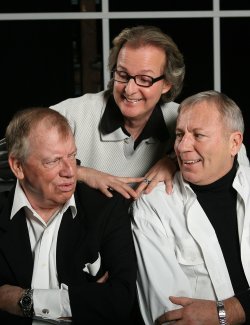
January 16, 2008
North York Mirror
What makes a great piece of art? If two people viewing the same painting have wildly different reactions, whoís to say which one is correct? Is it worth ending a 15-year friendship over? Yasmina Reza raises these, and other questions in the French play Art. This English translation by Christopher Hampton opened in London in 1994 and four years later arrived on Broadway where it won the Tony Award as best play of the season. Since then it has been translated into twenty-three languages.
Itís themes are that universal. Though a brief one-act piece, it manages to deliver more to think about than many three-act plays. If anything, the play goes too quickly, and youíll find yourself at times mentally reaching for the rewind button.
The premise is simple: long time friends Serge, Marc and Yvan have their friendship tested when Serge pays 200,000 francs for an all white painting. Marc is angered at what he considers a waste of money. Unable to let his friend enjoy his purchase, Marc constantly mocks and berates it. Their mutual friend Yvan is, as apparently always, caught in the middle trying to keep their friendship together. Itís an amazingly perceptive play, one that actually gains from repeated viewings.
This edition is being mounted by Stage Centre Productions at Fairview Library Theatre and as directed by L.Garth Allen beautifully balances the rising tension between the there protagonists with the wickedly funny dialogue. Still, he manages to slow down Yvanís extended story of the difficulties of planning his wedding. In other productions it is delivered at such a frantic pace that it becomes hard to follow. Not here.
Yvan is played with an almost puppy dog innocence by Alan Washbrook. His delivery of his psychiatristís succinct analysis of their 15-year friendship was delivered without irony, which is exactly the way Yvan would deliver it. Yvan believes it because his doctor told him so.
J.B. Pierre Rajotte is a bemused Serge, the proud owner of the painting that sets off this his friend Marc. Though equally passionate, he balances Marcís outbursts with thoughtful insights.
As Marc, Bob Martyn is uproariously uptight. He seems to take pleasure being what Serge describes as an ďenemy of modernism.Ē Itís an intense performance, more angry than other Marcs I have seen but one that is filled with a sense of righteousness.
Though it may be a short play, youíll want the time normally devoted to a second act to think about, discuss and digest the play. As you would with any great work of art.